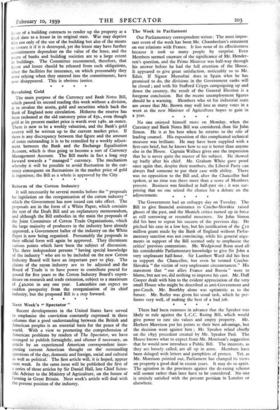The Government had an unhappy day on Tuesday. The Bill
to give financial assistance to Czecho-Slovakia raised ghosts of the past, and the Munich critics turned up in force as still sorrowing or resentful mourners. Sir John Simon did his best to repeat his success of the previous day. He pitched his case in a low key, but his justification of the L 1 o million grant made by the Bank of England without Parlia- mentary sanction was not convincing, while his general argu- ments in support of the Bill seemed only to emphasise the critics' previous contentions. Mr. Wedgwood Bean used all, his considerable Parliamentary knowledge to give Sir John a very unpleasant half-hour. Sir Lambert Ward did his best to support the Chancellor, but even he termed Czecho- Slovakia "the victim of very unpleasant circumstances." His statement that "our allies France and Russia" were to blame, but not we, did nothing to improve his case. Mr. Duff Cooper dealt with him to the evident appreciation of the very small House who might be described as anti-Government and pro-Czech. Mr. Boothby alone was optimistic as to the future. Mr. Butler was given his usual task, which he per- forms very well, of making the best of a bad job.














































 Previous page
Previous page